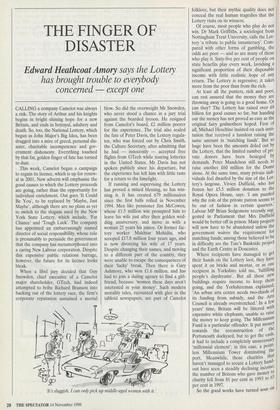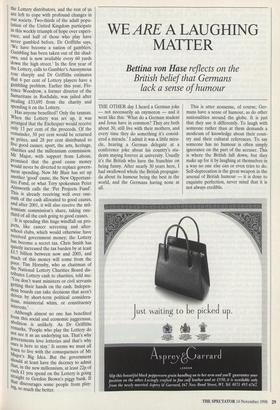THE FINGER OF DISASTER
Edward Heathcoat Amory says the Lottery
has brought trouble to everybody concerned — except one
CALLING a company Camelot was always a risk. The story of Arthur and his knights begins in bright shining hope for a new Britain, and ends in betrayal, adultery and death. So, too, the National Lottery, which began as John Major's Big Idea, has been dragged into a mire of greed, personal dis- aster, charitable incompetence and gov- ernment dishonesty. Everything touched by that fat, golden finger of fate has turned to dust.
This week, Camelot began a campaign to regain its licence, which is up for renew- al in 2001. New adverts will emphasise the good causes to which the Lottery proceeds are going, rather than the opportunity for individual enrichment. Out goes 'It Could Be You', to be replaced by 'Maybe, Just Maybe', although there are no plans as yet to switch to the slogans used by the New York State Lottery, which include, 'Fat Chance' and 'Tough Luck'. The company has appointed an embarrassingly named director of social responsibility, whose role is presumably to persuade the government that the company has metamorphosed into a caring New Labour corporation. Despite this expensive public relations barrage, however, the future for its licence looks bleak.
When a libel jury decided that Guy Snowden, chief executive of a Camelot major shareholder, GTech, had indeed attempted to bribe Richard Branson into backing out of the lottery race, the firm's corporate reputation sustained a mortal blow. So did the overweight Mr Snowden, who never stood a chance in a jury trial against the bearded tycoon. He resigned from Camelot's board, £2 million poorer for the experience. The trial also sealed the fate of Peter Davis, the Lottery regula- tor, who was forced out by Chris Smith, the Culture Secretary, after admitting that he had — innocently — accepted free flights from GTech while touring lotteries in the United States. Mr Davis has not spoken publicly since his departure, but the experience has left him with little taste for a return to the limelight.
If running and supervising the Lottery has proved a mixed blessing, so has win- ning it. It has created 679 millionaires since the first balls rolled in November 1994. Men like pensioner Jim McCowen, whose £1.5 million win prompted him to leave his wife just after their golden wed- ding anniversary, and move in with a woman 25 years his junior. Or former fac- tory worker Mukhtar Mohidin, who scooped £17.8 million four years ago, and is now divorcing his wife of 17 years. Despite changing their names, and moving to a different part of the country, they were unable to escape the consequences of their 'lucky' break. Then there is Gary Ashmore, who won £1.6 million, and has had to join a dating agency to find a girl- friend, because 'women these days aren't interested in your money'. Such modern morality tales, recounted with glee in the tabloid newspapers, are part of Camelot
'It's sluggish. I can only pick up middle-aged women with it.'
folklore, but their mythic quality does not conceal the real human tragedies that the Lottery visits on its winners.
Of course, most people who play do not win. Dr Mark Griffiths, a sociologist from Nottingham Trent University, calls the Lot- tery 'a tribute to public innumeracy'. Com- pared with other forms of gambling, the odds are poor — and so are many of those who play it. Sixty-five per cent of people on state benefits play every week, lavishing a significant proportion of their disposable income with little realistic hope of any return. The Lottery is regressive; it takes more from the poor than from the rich.
At least all the punters, rich and poor, can rest assured that the money they are throwing away is going to a good home. Or can they? The Lottery has raised over £6 billion for good causes so far, but handing out the money has not proved as easy as the original fairy godmothers hoped. First of all, Michael Heseltine insisted on each insti- tution that received a handout raising the same amount in 'matching funds'. But so huge have been the amounts doled out by the Lottery, that the limited number of pri- vate donors have been besieged by demands. Peter Mandelson still needs to raise another £60 million for the Dome alone. At the same time, many private indi- viduals feel dwarfed by the size of the Lot- tery's largesse. Vivien Duffield, who has frozen her £5.5 million donation to the Royal Opera House, says: 'I am puzzled why the role of the private patron seems to, be out of fashion in certain quarters.' Labour MP Brian Sedgemore recently sug- gested in Parliament that Mrs Duffield would be better off in prison. Many projects will now have to be abandoned unless the government waives the requirement for matching funds; among those believed to be in difficulty are the Tate's Bankside project and the Earth Centre in Doncaster.
Where recipients have managed to get their hands on the Lottery loot, they have spent it on bricks and mortar, or as one recipient in Yorkshire told me, 'fulfilling people's daydreams'. But all these new buildings require income to keep them going, and the Yorkshireman explained, `An urban arts centre needs two-thirds of its funding from subsidy, and the Arts Council is already overstretched.' In a few years' time, Britain will be littered with expensive white elephants, unable to raise the money to keep going. The Millennium Fund is a particular offender. It put money towards the reconstruction of the Portsmouth dockyard, but to get the cash, it had to include a completely unnecessary `millennial element'; in this case, a point- less Millennium Tower dominating the port. Meanwhile, those charities that haven't managed to secure a Lottery hand- out have seen a steadily declining income, the number of Britons who gave money to charity fell from 81 per cent in 1993 to 65 per cent in 1997. So the good works have turned sour on the Lottery distributors, and the rest of us are left to cope with profound changes in our society. Two-thirds of the adult popu- lation of the United Kingdom participate in this weekly triumph of hope over experi- ence, and half of those who play have never gambled before. Dr Griffiths says, We have become a nation of gamblers. Gambling has been taken out of the shad- ows, and is now available every 60 yards down the high street.' In the first year of the Lottery, calls to Gambler's Anonymous rose sharply and Dr Griffiths estimates that 6 per cent of Lottery players have a gambling problem. Earlier this year, Flo- rence Woodrow, a former director of the Samaritans in Rochdale, was jailed after stealing £33,695 from the charity and spending it on the Lottery. Has anyone benefited? Only the taxman. When the Lottery was set up, it was arranged that the Exchequer would receive only 13 per cent of the proceeds. Of the remainder, 50 per cent would be returned as prizes, and 28 per cent distributed to five good causes; sport, the arts, heritage, charities and the millennium commission. Mr Major, with support from Labour, promised that the good cause money would never be diverted to replace govern- ment spending. Now Mr Blair has set up another 'good' cause, the New Opportuni- ties Fund, or what Tory spokesman Peter Ainsworth calls the 'Pet Projects Fund'. This is already receiving well over one- sixth of the cash allocated to good causes, and after 2001, it will also receive the mil- lennium commission's share, taking one- third of all the cash going to good causes. • It is spending this huge windfall on pro- jects, like cancer screening and after- school clubs, which would otherwise have received government money; the Lottery has become a secret tax. Chris Smith has quietly increased the tax burden by at least 1-3.7 billion between now and 2005, and much of this money will come from the Poor. Tim Hornsby, who as chairman of the National Lottery Charities Board dis- tributes Lottery cash to charities, told me: You don't want ministers or civil servants getting their hands on the cash. Indepen- dent boards can take decisions that aren't driven by short-term political considera- tions, ministerial whim, or constituency interests.'
Although almost no one has benefited from this social and economic juggernaut, abolition is unlikely. As Dr Griffiths remarks, 'People who play the Lottery do not see it as an underlying tax. That's why governments love lotteries and that's why 0. ors is here to stay.' It seems we must all _larn to live with the consequences of Mr Major's Big Idea. But the government !.1,0111d at least have the decency to admit 'um, in the new millennium, at least 22p of each £1 you spend on the Lottery is going s..traight to Gordon Brown's piggy bank. If that discourages some people from play- ing, so much the better.



















































































 Previous page
Previous page